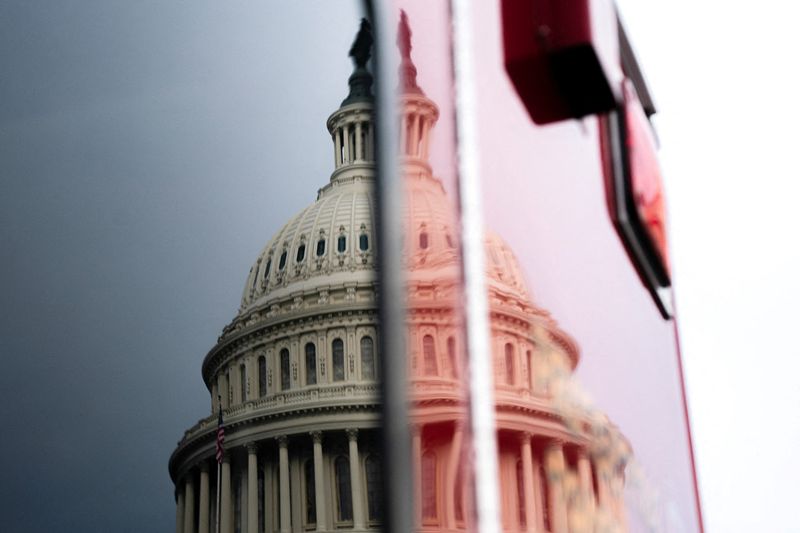By Andy Sullivan and Richard Cowan
WASHINGTON (Reuters) -The U.S. Congress and President Donald Trump have little time and few options remaining to reach a funding deal to avoid triggering disruptions in a range of U.S. government services and the furlough of hundreds of thousands of civil servants beginning on Wednesday.
WHAT COULD STAVE OFF A GOVERNMENT SHUTDOWN?
The Senate is expected to hold a second round of votes on Tuesday on competing plans to provide temporary funding for the government’s fiscal year that begins on Wednesday.
But Democrats are expected again to block Republicans’ legislation, as they did after its September 19 passage by the House of Representatives in a mostly partisan vote. It would provide money for federal agency programs through November 21.
And Republicans are expected to again block Democrats’ bill funding the government through October 31, which has controversial new provisions helping Americans pay for their federally-backed health insurance.
Alternatively, a last-ditch effort at compromise in Congress before the midnight Tuesday deadline — the close of the 2025 fiscal year — could be mounted. But there were no overt signs of that happening. To succeed, the effort would have to be blessed by Trump and pass both the Senate and the House of Representatives rapidly.
However, the House is not in session and its members are scattered throughout the country until Wednesday, when a shutdown already would be rolling through government offices.
WHAT DO REPUBLICANS WANT?
Trump’s Republicans control both the House of Representatives and the Senate, and they have already scored big budget wins this year. The massive legislation called the “One Big Beautiful Bill,” passed in July, boosted spending for defense and immigration enforcement, rolled back spending on green energy and other Democratic priorities, while making major cuts in the Medicaid healthcare program for low-income and disabled people to help pay for tax cuts focused mainly on the wealthy.
Republicans also have broadly supported the White House’s efforts to claw back money that had already been approved by Congress for foreign aid and public broadcasting, even though that undermines lawmakers’ constitutional authority over spending matters.
They have said they would vote for a continuing resolution that would extend funding at current levels through November 21 to allow more time to negotiate a full-year deal.
WHAT DO DEMOCRATS WANT?
As the minority party, Democrats do not have much power. However, Republicans will need at least seven Democratic votes to pass any spending bill out of the Senate, where 60 votes are needed to advance most legislation in the 100-seat chamber.
This time, Democrats are using that leverage to push for renewing expanded healthcare subsidies for people who buy insurance through the Affordable Care Act. Their proposal would make permanent enhanced tax breaks that are otherwise due to expire at the end of the year and make them available to more middle-income households.
If those tax breaks are allowed to expire, health insurance costs will increase dramatically for many of the 24 million Americans who get their coverage through the ACA, according to the nonpartisan Kaiser Family Foundation. The impact would be most acute in Republican-controlled states that have refused to expand the Medicaid health plan for the poor.
Democrats also want language inserted into any temporary funding bill that would prohibit Trump from unilaterally ignoring their ACA provisions or temporarily withholding funds.
They also want to roll back other restrictions on ACA coverage that were enacted in the “One Big Beautiful Bill.”
Those changes would provide health coverage for seven million Americans by 2035, according to the nonpartisan Congressional Budget Office, but also increase government healthcare spending by $662 billion over 10 years.
Republicans say they are open to considering a fix for the expiring tax breaks, but say the issue should be handled separately and it was unclear whether their “fix” would differ substantially from the Democrats’. Republicans have accused Democrats of trying to use the stopgap funding bill to open the gates for government healthcare subsidies for illegal immigrants.
Congressional Democrats argue that group of people living in the United States is prohibited by law from receiving such help and that their legislation would not change that.
(Reporting by Andy Sullivan and Richard Cowan; editing by Scott Malone and Alistair Bell)

